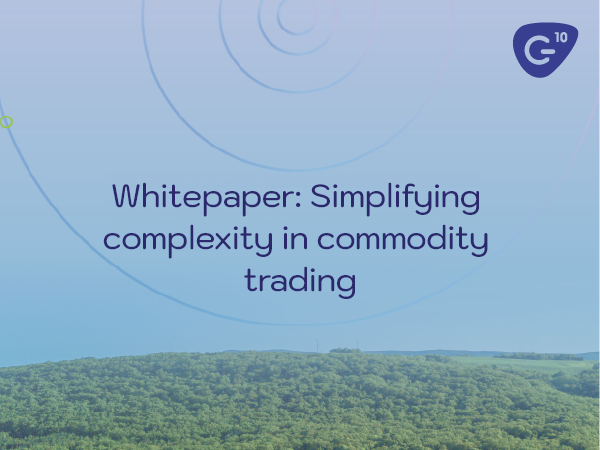Commodity traceability is often discussed in relation to sustainability, but it actually encompasses a far wider remit than that and is tied to a wide range of commodity risk management practices too. We have already explored how traceability practices can improve supply chain resilience, agility, and more. Today, we are taking a different look at traceability and discussing just some of the legislation that makes tracking traceability essential across all commodities to mitigate against legal and legislative risks.
Traceability legislation is complex, ever-evolving and dependent on the specific regions and commodities you are operating in. It covers areas including human rights, land use, carbon emissions, geopolitical sanctions, and more. The below is by no means a comprehensive list, merely an illustration of just how many aspects of traceability compliance there actually are.
Anti-slavery legislation
Much of the legislation that impacts commodity traceability is not directly targeted at commodity traders. For example, many anti-slavery laws target commodity merchants’ clients with legislation ensuring better supply chain visibility. The UK’s Modern Slavery Act 2015 applies to organisations with an annual turnover of over £36 million, who must publish a statement each year on the steps they have taken to identify, address and prevent modern slavery in their supply chains. Similar anti-slavery legislation is in effect in various European countries and the USA, which in 2022 also added the new Uyghur Forced Labor Prevention Act to specifically combat the high risk of forced labour in the Uyghur Region.
EU Legislation
The EU has had a particular focus on traceability to support its sustainability agenda in recent years. For example, the EU Carbon Border Adjustment Mechanism (CBAM), is a tariff on carbon-intensive goods imported into the region, including cement, iron and steel, aluminium, fertilisers, electricity and hydrogen. The CBAM enforces traceability in carbon accounting, as products’ carbon emissions above a given cap must be offset by surrendering CBAM certificates. The first reporting period for this legislation began in October 2023.
The EU also has deforestation and biodiversity in its sights with the EU Deforestation Regulation (EUDR). The EUDR applies to several agricultural commodities, including cocoa, cattle, palm oil, soya, wood, rubber, charcoal, and paper products. These products can only be sold into the EU in the future if the supplier can confirm that they do not come from deforested land and that they meet local sustainability legislation too.
Organisations, of course, should have been meeting these local laws anyway, but with the EUDR, they now need to evidence this across the supply chain, which could mean significantly more chain of custody tracking. And trading and processing organisations will need to ensure that certifications match the actual origin of each shipment. To take palm oil as an example, Indonesia and Malaysia each have their own standards for sustainable palm oil, which any blended cargoes or processing would need to monitor and account for.
And the EUDR means that traceability needs to be assured back to the originating farm, not simply the country of origin, with the European Commission stating that geolocation data must be provided and that satellite imagery or other photography may be used to demonstrate that no deforestation has occurred.
Conflict minerals
Metals and mining is another area where traceability is not as straightforward as simply following the commodities legislation. In the US, the Dodd-Frank Act of 2010 is primarily concerned with banking resilience and consumer protection following the 2008 financial crisis. But this legislation also includes the stipulation that organisations must disclose any use of conflict minerals and conduct a reasonable country of origin inquiry.
Not all conflict minerals traceability is tied to legislation either. In 2016, the OECD published Due Diligence Guidance for Responsible Supply Chains of Minerals from Conflict-Affected and High-Risk Areas. These are only recommendations but are increasingly being treated as mandatory, by organisations such as the LME, which began introducing its responsible sourcing requirements in January 2021, meaning that any brands trading via the LME must follow them.
Food safety
Many large economies mandate country of origin food labelling, including China, Japan, Singapore, and Australia. As traceability is becoming more advanced, these laws are also evolving and incorporating stricter traceability. For example, in the US, the 2020 FDA Proposed Rule for Food Traceability expands existing food traceability initiatives with an unprecedented level of detail.
The proposal would see anyone involved in the supply chain of specific items needing to track and trace the supply chain, rather than the current requirement to declare where it was bought from and sold to. It also standardises data collection, specifying the Key Data Elements that need to be collected and the Critical Tracking Events that trigger this data collection. This regulation, if implemented, could account for 20% to 30% of food consumed in the US and be the most sweeping change in food regulation to emerge in decades.
Conclusion
There are many different pieces of legislation that make commodities traceability essential, and these continue to grow in both number and scope. Many of these laws are local or targeting industries outside of commodities, but still have an impact on commodity traceability, so traders are facing increasing demands for better traceability from supply chain partners and clients who are mitigating their own legislative risks.
The overarching theme of all these different requirements is that commodities traceability is of growing importance to governments as well as to end consumers, and that all supply chain participants need to proactively engage with traceability initiatives if they are to stay ahead of the legislation and up to date with what their clients need from them.
Want to read more?
Subscribe now for monthly updates
By submitting your details you agree that we can store your data and communicate with you. You can opt out of these communications at any time. Read all in our Privacy Policy.



